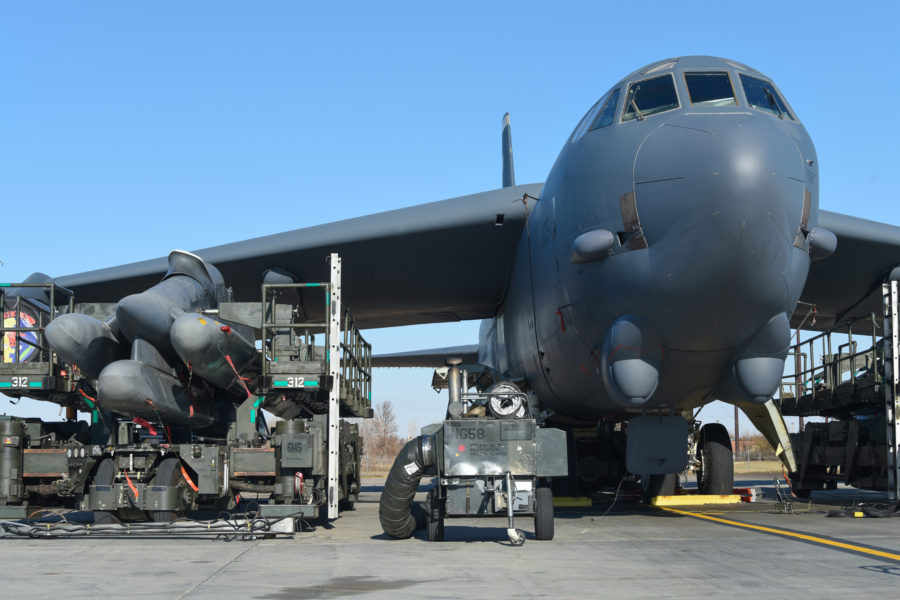The U.S. will not share key data on its nuclear arsenal with Russia after Moscow refused to do the same with its own strategic forces, Biden administration officials said March 28—yet another blow to the New START agreement.
The move marks the first time the Biden administration has responded to Russian President Vladimir Putin’s announcement that he was “suspending” Moscow’s participation in the treaty.
“Under the treaty, we exchange data on kind of high-level numbers,” assistant secretary of defense for space policy John Plumb told the House Armed Services Strategic Forces subcommittee. “Russia responded that they will not be providing that information. So as a diplomatic countermeasure, the United States will not be providing that information back.”
The two countries faced a March 31 deadline for exchanging detailed data on their numbers of deployed nuclear forces as part of a regular six-month cycle.
New START limits the U.S. and Russia to 1,550 deployed warheads. U.S. officials say they assess that Russia is still under its treaty limits, and Pentagon leaders have stated they plan to adhere to the other provision’s limits and are not keen to engage in an arms race.
“We all understand that nuclear deterrence isn’t just a numbers game,” Secretary of Defense Lloyd J. Austin III said in December before Putin announced his suspension of the treaty. “In fact, that sort of thinking can spur a dangerous arms race.”
The data the U.S. plans to withhold includes information on the number of bombers, missiles, and nuclear warheads that are deployed at specific U.S. bases. However, the U.S. is continuing to provide Russia with notifications of the movements of its strategic bombers, missiles, submarines, and their operational status as required under the treaty.
“We are going to continue to examine what diplomatic countermeasures are appropriate,” Plumb said. “What we’re trying to do is balance both responding to Russia’s irresponsible behavior, but to continue to demonstrate what we believe a responsible nuclear power actually should be.”
Daryl Kimball, the executive director of the Arms Control Association, was critical of the U.S. decision not to share data but said the administration was right to continue the notifications.
“That will reduce the possibility that Russia misconstrues a particular movement of a strategic system as something that it is not,” Kimball added.
Russia has refused onsite inspections, declined to attend meetings on compliance issues, refused to exchange data, and has stopped notifying the U.S. of the movements of its strategic nuclear forces. Moscow, however, hasn’t rejected all limitations on its nuclear forces. In suspending its participation in the accord, Russia’s Foreign Ministry said Moscow would continue to observe limits on the number of nuclear warheads it can deploy under the treaty “in order to maintain a sufficient degree of predictability and stability in the sphere of nuclear missiles.”
Moscow will continue to notify the U.S. when it plans to test launch intercontinental ballistic missiles and submarine-launched ballistic missiles under a 1988 agreement, the foreign ministry said.
The White House noted the tit-for-tat nature of the U.S. response but said it made the decision not to provide the data to Russia because Moscow was unwilling to hold up its end of the bargain.
“We would prefer to be able to do them, but it requires them being willing as well,” National Security Council strategic communications coordinator John Kirby said of the data exchanges.
Kirby said the Biden administration is still holding out hope to revive the treaty, which expires in 2026.
“We believe that the New START treaty is good for both our countries—heck, it’s good for the world—when our two countries are in full compliance with our New START obligations,” Kirby said.
The future of arms control is unclear. U.S. officials and military leaders have cautioned that with China’s increasing nuclear expansion, the U.S. will face two large, and possibly unconstrained, nuclear-armed countries for the first time in history. But China has shown no interest so far in joining nuclear talks with the U.S., and the U.S. and Russia are not currently involved in talks about a possible agreement after New START and have previously had deep differences over what should be covered under a future accord.
“A competition is underway among major powers to try to shape what comes next,” Air Force Gen. Anthony J. Cotton said when he took over U.S. Strategic Command in December. “New perils are ahead of us.”
